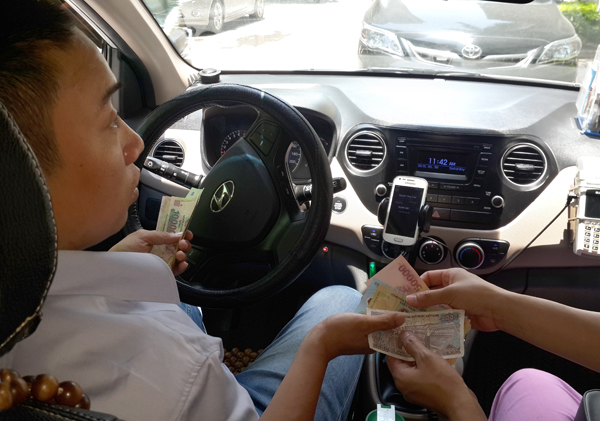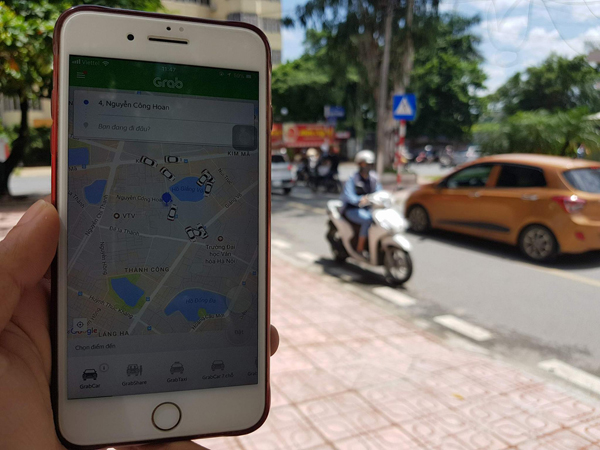Uber and Grab drivers suddenly up to neck in tax arrears
 |
| Uber and Grab drivers are worried that they might be imposed a lot of taxes and fees when selling their cars |
Tens of millions of dongs in tax arrears
On September 19, Nguyen Van Xang from the northern province of Ha Nam told a reporter, that after talks with friends, in June 2015 he decided to borrow money and buy a Kia K3 to drive for Uber.
In order to register his car in Hanoi, he was advised by a car salesman to apply for a registration certificate for household businesses, with which he could register as an Uber driver. The fee for the whole “service package” was VND5 million ($220).
After years of driving for Uber without any trouble, as the family has run on a rough patch recently and needed money to cover expenses, in May 2017 he decided to sell his car for VND500 million ($22,026).
However, while going through the procedures to transfer the vehicle ownership, the buyer requested him to provide invoices after he discovered that the vehicle had been registered for a household business.
When Xang visited the tax office to complete procedures for the issuance of invoices, he was charged with a range of tax fees, such as business licence tax and personal income tax, among others.
Xang was also fined for delays in tax declaration as well as the fulfilment of tax obligations from more than two years ago. The total amount payable to receive the invoices was nearly VND30 million ($1,322).
“I was extremely shocked to hear about the payables. I have not heard about any of this before,” Xang said.
Feeling overwhelmed with the amount of tax arrears he had to pay, Xang tried to bring his car to second-hand car dealers in Hanoi's Duong Dinh Nghe Street for a sell-off. However, the dealers only gave him a cold shoulder after finding out that the car was registered for a household business.
Several showrooms agreed to buy the car, but also asked him to provide the invoices for his car so that they can transfer the ownership to future customers later.
“The family is really in need of money. I will have to bear major losses if I sell the car, but now the deal won’t even get me VND500 million ($22,026) and I have to pay a lot of taxes and fees,” Xang said bitterly.
After learning more about the situation, Xang found out that not only him, but many other Uber drivers are facing the same troubles. Particularly, more than half of then have bought and registered cars as vehicles for household businesses and most do not know about these regulations.
Dao Viet Quan from Nam Dinh, who drives for Grab in Hanoi, said: “The Grand i10 I am currently driving is also registered as a vehicle for household business. After buying this car, the salesman asked me about how I would use it and advised me to choose this form of registration. Although I do not have the need to transfer my car, I was also confused and panicked when hearing about this.”
Speaking with the reporter on the issue, Trinh Xuan Son, a tax officer of the Ba Dinh Tax Department (Hanoi), said: “According to the regulations, individuals registering cars as vehicles for household businesses, will have to go to the local tax department where they registered the vehicles to declare taxes and complete necessary procedures. In the above case, it looks like the person attempted to use “services” provided by illegal intermediaries. Hence, he was not informed about the regulations on tax duty by tax officials.”
Son said that Xang is subject to certain taxes, such as business licence tax (per year), VAT (for individual households with annual revenue over VND100 million ($4,405)), and personal income tax. In addition, Xang will be fined for delaying his tax obligations for more than two years.
 |
| Uber and Grab services are getting more popular due to their flexibility and competitive rates |
Thousands of Uber and Grab drivers crying out
As a person who independently completed all procedures to register his car as a vehicle for household business, Truong Minh Tuan, an Uber driver in Hanoi, said: “When driving for Uber, I had to learn all the information carefully and thoroughly. I decided to complete all the registration procedures on my own. Currently, in addition to the business licence tax paid from the time of declaration at the beginning of the year, which was about VND1 million ($44), I go to the tax office each month to pay the remaining taxes and fees. However, after the government requested Uber and Grab to register their legal entities as transport agencies, I suddenly have to bear double obligations. Now I have to pay taxes for the tax authorities and an additional amount of VND500,000 per year for the transport agency.”
Nguyen Xuan Truong (Hai Ba Trung, Hanoi) said: “When deciding to buy a car to drive for Grab, I also made a thorough research. However, in the end, due to the complicated procedures in applying for a registration certificate for household business, I decided to register it as a personal vehicle and sent my car to a transport cooperative in Hadong. If a driver is registered as a worker at a transport enterprise, he or she will not be required to pay taxes because it is part of the business’s obligations and they will be held responsible for any procedures related to the vehicle.”
According to the manager of a car leasing company in Hanoi, of the nearly 4,000 vehicles under the management of businesses, up to a quarter were registered for their legal entity so that drivers can ensure their legitimate status when driving for Uber and Grab. Of these, the majority were registered as household businesses. When they found out about their tax obligations, many drivers were very confused.
According to him, if drivers from other provinces want to have their cars registered in Hanoi to drive for Grab and Uber, they can simply ask relatives in Hanoi to register the vehicles for them. As such, when the car is ready for sale, they just need to carry out notarisation procedures to authorise transfer between two parties.
Another popular form nowadays is for drivers to register their cars under the name of a transport company. Thus, the driver will not have to pay taxes or fulfil other obligations because the transport cooperative will dispense with them. However, the driver will have to pay about VND10 million ($440) for the company, plus an annual management fee ranging from VND500,000 ($22) to VND1 million ($44).
What the stars mean:
★ Poor ★ ★ Promising ★★★ Good ★★★★ Very good ★★★★★ Exceptional
Themes: Ride-hailing services
Latest News
More News
- Ericsson a trusted partner in the digital economy (December 03, 2025 | 10:33)
- 5G and AI to shape next phase of digital economy (December 03, 2025 | 10:25)
- Fly to Con Dao from 0 VND with Vietjet mega promotion (December 02, 2025 | 16:50)
- Tien Phong strives for a greener plastics industry (December 02, 2025 | 09:22)
- Czech enterprises strengthen presence (December 01, 2025 | 18:00)
- New phase launched to support women-led ventures (December 01, 2025 | 15:08)
- Airlines race to patch Airbus A320/A321 fleets (December 01, 2025 | 09:17)
- European expertise to boost Vietnam’s sustainable logistics push (November 29, 2025 | 10:00)
- AkzoNobel: from painting walls to painting the future (November 28, 2025 | 13:31)
- Tien Phong Plastic ready for a new growth cycle (November 28, 2025 | 10:56)
















 Mobile Version
Mobile Version